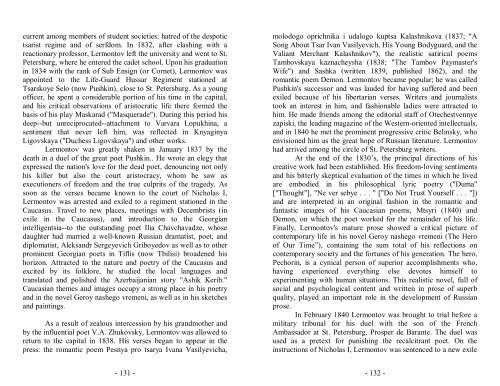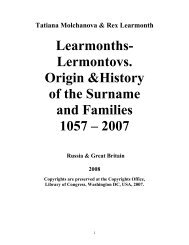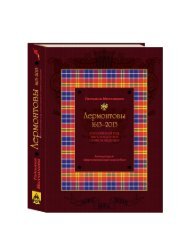LEARMONTH-LERMONTOV. A HYISTORY OF THE NAME AND FAMILIES
By Tatiana Molchanova and Rex Learmonth, 2011
By Tatiana Molchanova and Rex Learmonth, 2011
- No tags were found...
Create successful ePaper yourself
Turn your PDF publications into a flip-book with our unique Google optimized e-Paper software.
current among members of student societies: hatred of the despotic<br />
tsarist regime and of serfdom. In 1832, after clashing with a<br />
reactionary professor, Lermontov left the university and went to St.<br />
Petersburg, where he entered the cadet school. Upon his graduation<br />
in 1834 with the rank of Sub Ensign (or Cornet), Lermontov was<br />
appointed to the Life-Guard Hussar Regiment stationed at<br />
Tsarskoye Selo (now Pushkin), close to St. Petersburg. As a young<br />
officer, he spent a considerable portion of his time in the capital,<br />
and his critical observations of aristocratic life there formed the<br />
basis of his play Maskarad ("Masquerade"). During this period his<br />
deep--but unreciprocated--attachment to Varvara Lopukhina, a<br />
sentiment that never left him, was reflected in Knyaginya<br />
Ligovskaya ("Duchess Ligovskaya") and other works.<br />
Lermontov was greatly shaken in January 1837 by the<br />
death in a duel of the great poet Pushkin.. He wrote an elegy that<br />
expressed the nation's love for the dead poet, denouncing not only<br />
his killer but also the court aristocracy, whom he saw as<br />
executioners of freedom and the true culprits of the tragedy. As<br />
soon as the verses became known to the court of Nicholas I,<br />
Lermontov was arrested and exiled to a regiment stationed in the<br />
Caucasus. Travel to new places, meetings with Decembrists (in<br />
exile in the Caucasus), and introduction to the Georgian<br />
intelligentsia--to the outstanding poet Ilia Chavchavadze, whose<br />
daughter had married a well-known Russian dramatist, poet, and<br />
diplomatist, Aleksandr Sergeyevich Griboyedov as well as to other<br />
prominent Georgian poets in Tiflis (now Tbilisi) broadened his<br />
horizon. Attracted to the nature and poetry of the Caucasus and<br />
excited by its folklore, he studied the local languages and<br />
translated and polished the Azerbaijanian story "Ashik Kerib."<br />
Caucasian themes and images occupy a strong place in his poetry<br />
and in the novel Geroy nashego vremeni, as well as in his sketches<br />
and paintings.<br />
As a result of zealous intercession by his grandmother and<br />
by the influential poet V.A. Zhukovsky, Lermontov was allowed to<br />
return to the capital in 1838. His verses began to appear in the<br />
press: the romantic poem Pesnya pro tsarya Ivana Vasilyevicha,<br />
molodogo oprichnika i udalogo kuptsa Kalashnikova (1837; "A<br />
Song About Tsar Ivan Vasilyevich, His Young Bodyguard, and the<br />
Valiant Merchant Kalashnikov"), the realistic satirical poems<br />
Tambovskaya kaznacheysha (1838; "The Tambov Paymaster's<br />
Wife") and Sashka (written 1839, published 1862), and the<br />
romantic poem Demon. Lermontov became popular; he was called<br />
Pushkin's successor and was lauded for having suffered and been<br />
exiled because of his libertarian verses. Writers and journalists<br />
took an interest in him, and fashionable ladies were attracted to<br />
him. He made friends among the editorial staff of Otechestvennye<br />
zapiski, the leading magazine of the Western-oriented intellectuals,<br />
and in 1840 he met the prominent progressive critic Belinsky, who<br />
envisioned him as the great hope of Russian literature. Lermontov<br />
had arrived among the circle of St. Petersburg writers.<br />
At the end of the 1830’s, the principal directions of his<br />
creative work had been established. His freedom-loving sentiments<br />
and his bitterly skeptical evaluation of the times in which he lived<br />
are embodied in his philosophical lyric poetry ("Duma"<br />
["Thought"], "Ne ver sebye . . . " ["Do Not Trust Yourself . . . "])<br />
and are interpreted in an original fashion in the romantic and<br />
fantastic images of his Caucasian poems, Mtsyri (1840) and<br />
Demon, on which the poet worked for the remainder of his life.<br />
Finally, Lermontov's mature prose showed a critical picture of<br />
contemporary life in his novel Geroy nashego vremeni (The Hero<br />
of Our Time”), containing the sum total of his reflections on<br />
contemporary society and the fortunes of his generation. The hero,<br />
Pechorin, is a cynical person of superior accomplishments who,<br />
having experienced everything else devotes himself to<br />
experimenting with human situations. This realistic novel, full of<br />
social and psychological content and written in prose of superb<br />
quality, played an important role in the development of Russian<br />
prose.<br />
In February 1840 Lermontov was brought to trial before a<br />
military tribunal for his duel with the son of the French<br />
Ambassador at St. Petersburg, Prosper de Barante. The duel was<br />
used as a pretext for punishing the recalcitrant poet. On the<br />
instructions of Nicholas I, Lermontov was sentenced to a new exile<br />
- 131 -<br />
- 132 -






